Festivals, Food & Tourism
Assam, nestled in the heart of Northeast India, stands as a vibrant tapestry of rich cultural heritage, exquisite cuisine, and breathtaking natural beauty. This enchanting state offers travelers an unparalleled journey through traditional festivals, authentic Assamese food, and diverse tourism experiences that showcase the essence of India's northeastern frontier. From the rhythmic beats of Bihu celebrations to the aromatic flavors of traditional cuisine and the majestic wildlife of Kaziranga, Assam tourism presents an immersive cultural adventure that captivates every visitor.
The culture of Assam reflects a harmonious blend of indigenous traditions, agricultural practices, and diverse tribal influences that have shaped the region for centuries. Whether you're seeking spiritual enlightenment, culinary adventures, or wildlife encounters, travel to Assam promises unforgettable experiences that celebrate the state's unique identity and welcoming hospitality.
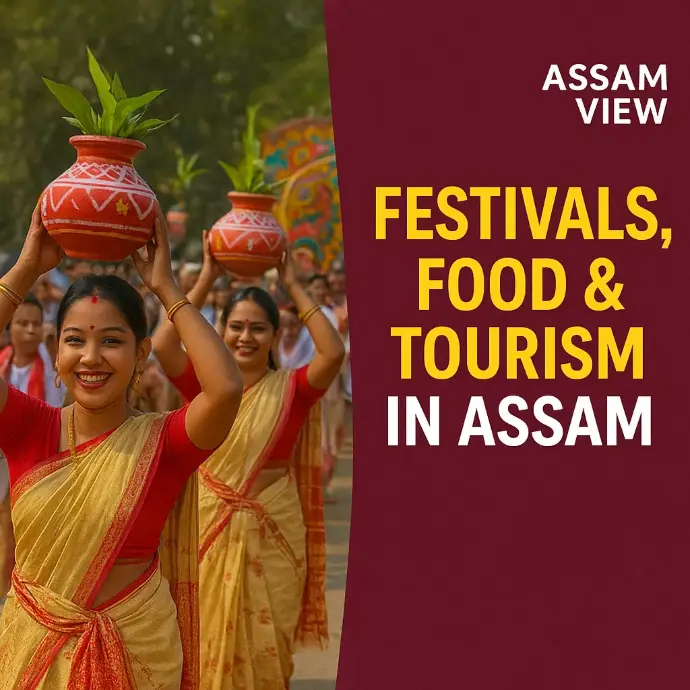
Festivals of Assam: Celebrating Life, Unity, and Traditions
Bihu - The Heart and Soul of Assamese Culture
Bihu stands as the most significant festival in Assam, embodying the agricultural spirit and cultural identity of the Assamese people. This magnificent celebration occurs three times annually, each marking crucial phases of the agricultural cycle and seasonal transitions.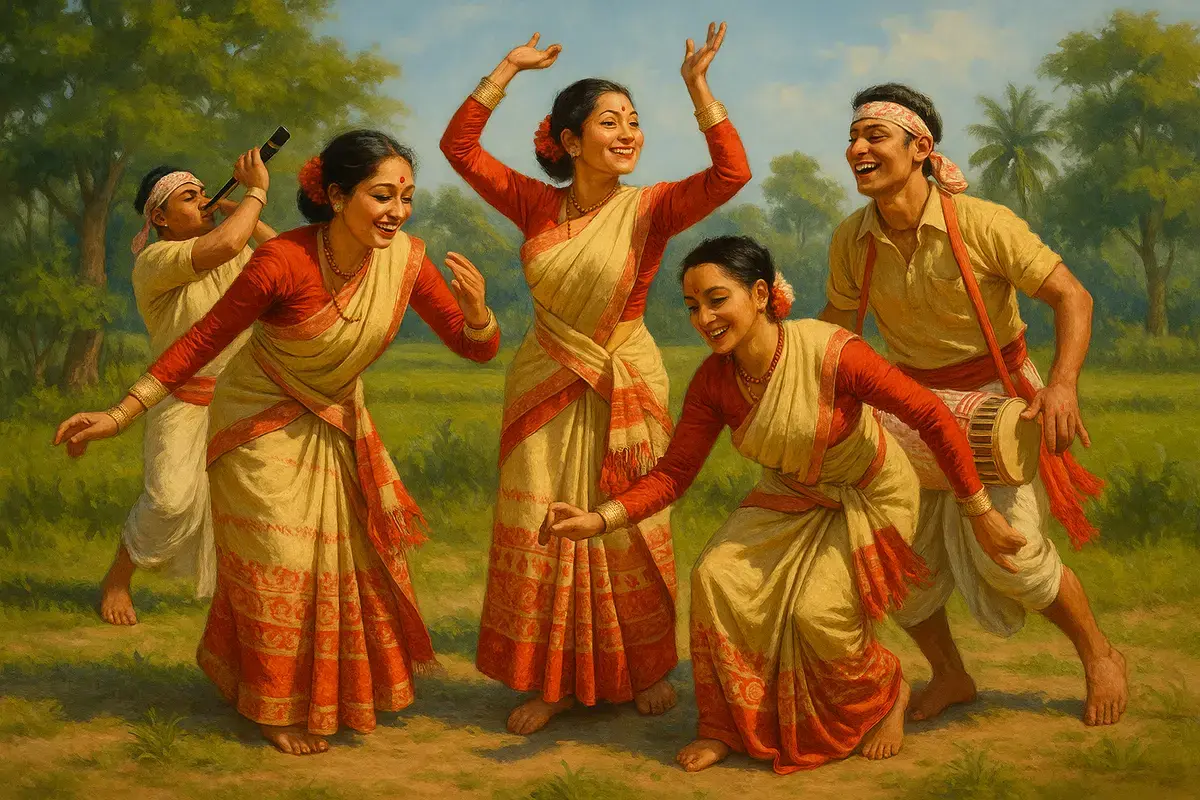
Rongali Bihu (Bohag Bihu) celebrates the Assamese New Year in mid-April, coinciding with spring's arrival. This vibrant festival marks the beginning of the sowing season and represents happiness, prosperity, and new beginnings. Communities gather to perform the energetic Bihu dance, where young men and women showcase traditional choreography accompanied by dhol drums and pepa flutes.
Bhogali Bihu (Magh Bihu) occurs in January, celebrating the harvest season with community feasts and bonfire ceremonies. This festival emphasizes abundance and gratitude for successful harvests, bringing families together for elaborate meals and traditional celebrations.
Kongali Bihu (Kati Bihu) takes place in October during the lean period when rice paddies are maturing. This solemn festival involves prayers and rituals to protect crops from pests and natural calamities, demonstrating the deep connection between Assamese culture and agricultural practices.
Ali-Ai-Ligang: The Mising Community's Spring Celebration
The Ali-Ai-Ligang festival represents one of Assam's most authentic tribal celebrations, observed by the Mising community during February-March. The festival name derives from "Ali" (legumes), "Aye" (seed), and "Ligang" (to sow), symbolizing the ceremonial beginning of paddy cultivation.
This five-day celebration commences with ritual paddy sowing ceremonies and continues with traditional Gumraag dances performed by community youth. The festival concludes with "Lilen," a grand community feast featuring traditional delicacies including Poro Apong (rice wine), pork dishes, and Purang Apin (special packed boiled rice).
Baishagu: The Bodo Community's New Year Festival
Baishagu represents the most cherished festival of the Bodo Kachari tribe, celebrated in April to welcome the New Year. This colorful celebration features traditional musical instruments including Khawbang, Jotha, Gogona, Siphung, and Kham, creating rhythmic melodies that accompany community dances.
The festival culminates with "Garjasali," a community prayer gathering where participants seek blessings for prosperity and harmony. Baishagu demonstrates the diverse cultural fabric that makes Assam festivals so unique and inclusive.
Jonbeel Mela: A Living Heritage of Barter Trade
The Jonbeel Mela stands as one of India's most extraordinary cultural phenomena, representing the country's only surviving barter system fair. Held annually during Magh Bihu weekend at Dayang Belguri near Jagiroad, this three-day festival dates back to the 15th century.
Tribal communities from hills including Karbi, Khasi, and Jaintia people descend to exchange goods with plains dwellers using traditional barter methods. Hill residents bring herbs, spices, turmeric, and fruits, exchanging them for rice, fish, and traditional sweets. The festival promotes communal harmony and preserves ancient trading practices that emphasize trust and cultural exchange.
Durga Puja and Other Celebrations
Durga Puja transforms Assam into a spectacular showcase of artistic grandeur and devotional fervor. This festival displays elaborate decorations, traditional performances, and vibrant processions that attract visitors from across India and beyond.
Ambubachi Mela at Kamakhya Temple represents one of Assam's most significant spiritual gatherings, celebrating divine femininity and tantric traditions. During this monsoon festival, thousands of devotees visit Guwahati to participate in sacred rituals and seek blessings.
Food of Assam: A Culinary Journey Through Traditional Flavors
The Philosophy of Assamese Cuisine
Assamese food embodies a unique culinary philosophy that balances six fundamental tastes, including the distinctive alkaline and sour flavors rarely found elsewhere in India. This cuisine reflects the region's agricultural heritage, abundant freshwater resources, and diverse tribal influences that create remarkable flavor combinations.
Traditional meals follow a structured sequence beginning with Khar (alkaline dishes) and concluding with Tenga (sour preparations), usually featuring fish as the primary protein. This dining pattern demonstrates the sophisticated understanding of taste balance and digestive principles embedded in Assamese culinary traditions.
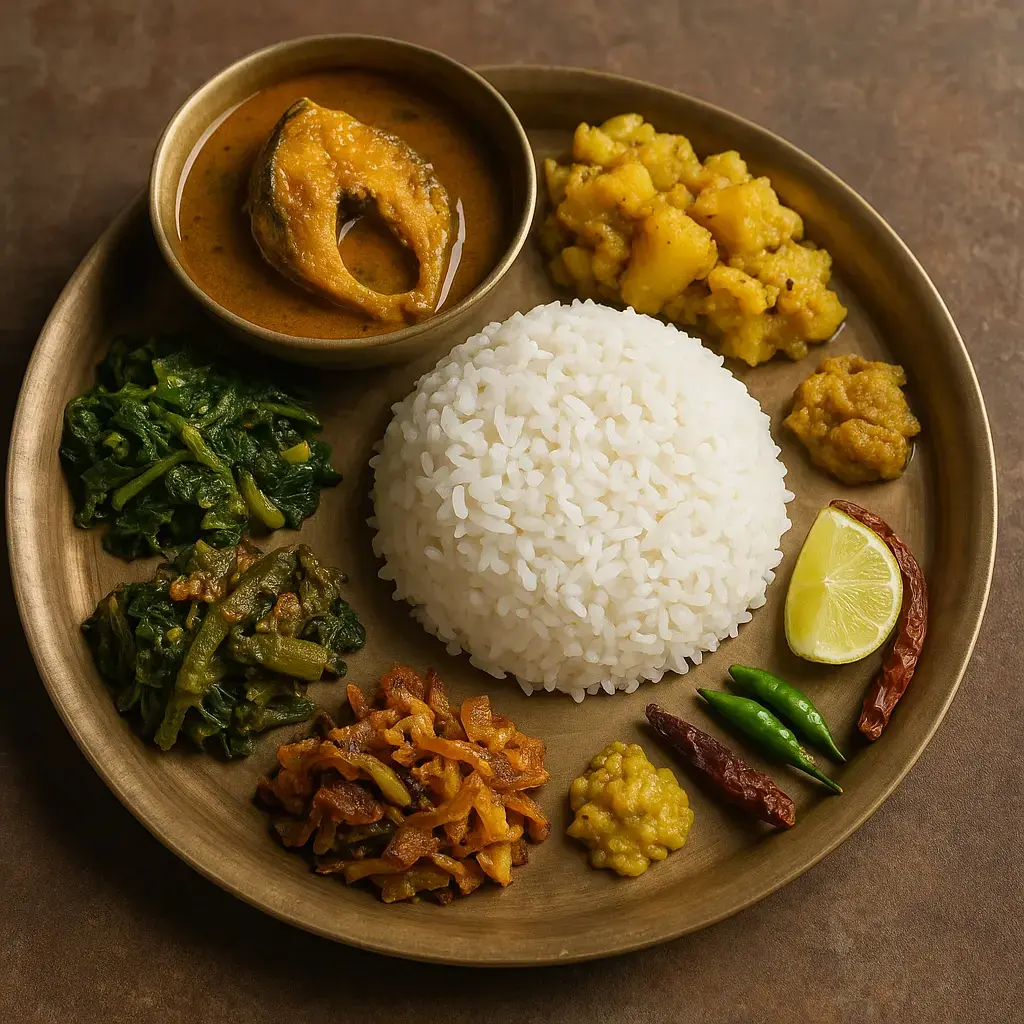
Staple Dishes and Traditional Preparations
Masor Tenga ranks as the quintessential Assamese dish, featuring tangy fish curry that perfectly embodies the state's culinary identity. This light, flavorful preparation uses tomatoes, lemon, or elephant apple to create the characteristic sourness, making it especially refreshing during summer months.
Khar represents Assam's most distinctive culinary contribution, prepared using alkaline water filtered through sun-dried banana peel ash. This unique ingredient creates various preparations with raw papaya, pulses, vegetables, or fish, offering both flavor and traditional medicinal benefits.
Duck Meat Curry (Haa or Kumurat diya Hanhor Mangxo) stands as a signature celebration dish, typically prepared with ash gourd and traditional spices. The combination creates rich, aromatic flavors that make this curry essential for special occasions and festivals.
Pitika encompasses various mashed preparations using roasted or boiled vegetables, fish, or meat, enhanced with mustard oil, green chilies, onions, and coriander leaves. Aloo Pitika represents the most popular version, showcasing the comfort food traditions of Assamese cuisine.
Traditional Sweets and Festival Foods
Pitha varieties form the cornerstone of Assamese dessert traditions, particularly during Bihu celebrations. Til Pitha combines rice flour with black sesame seeds and jaggery, creating cylindrical treats with nutty sweetness and distinctive texture.
Narikol Laru (coconut laddoos) represents the sweet soul of festival celebrations, made with fresh coconut and jaggery. These sticky, chewy delights symbolize hospitality and joy, commonly shared with guests during special occasions.
Ghila Pitha offers dense, spongy texture through rice flour and jaggery preparations, deep-fried to golden perfection. This comfort food brings nostalgic memories to anyone familiar with Assamese festival traditions.
Bamboo Shoot Delicacies and Meat Preparations
Bamboo shoot preparations represent unique aspects of Assam traditional cuisine, featuring fermented shoots that add distinctive flavors to various dishes. Pork with Bamboo Shoot combines smoked pork with fermented bamboo shoots, tomatoes, and ghost peppers, creating intense, memorable flavors.
These preparations demonstrate the sophisticated fermentation techniques and bold flavor profiles that distinguish Assamese cuisine from other Indian regional foods.
Tea Culture: The Liquid Gold of Assam
Assam's tea culture extends beyond commercial production to encompass deep cultural significance and daily life traditions. The state produces over 50% of India's tea exports, with gardens employing hundreds of thousands of workers who maintain this vital industry.
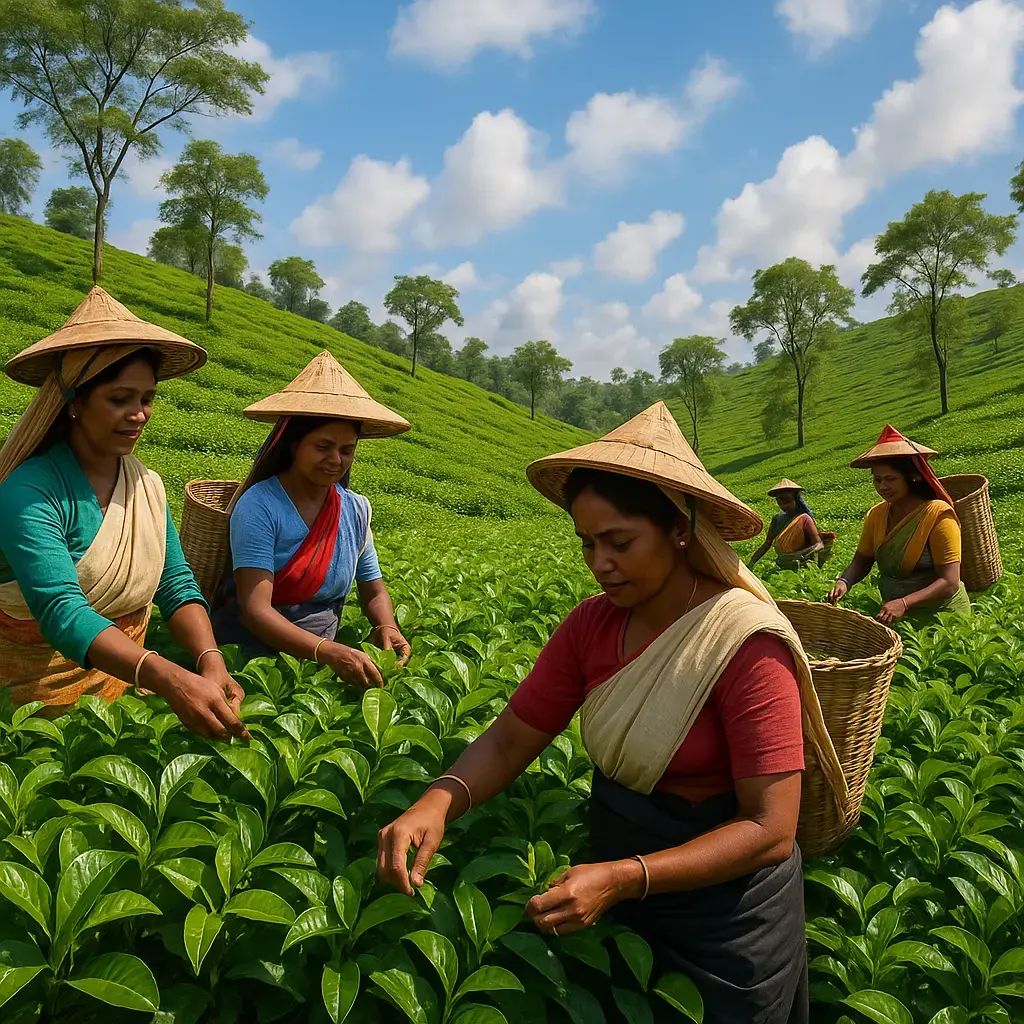
Assam tea offers distinctive malty flavors and robust character that make it internationally renowned. Traditional tea preparation involves strong brewing methods that complement the hearty Assamese meal patterns and provide energy for agricultural work.
Tourism in Assam: Natural Wonders and Cultural Heritage
Kaziranga National Park: Wildlife Conservation Success
Kaziranga National Park stands as Assam's crown jewel, housing two-thirds of the world's one-horned rhinoceros population. This UNESCO World Heritage Site represents one of India's greatest wildlife conservation successes, protecting diverse ecosystems across grasslands, wetlands, and forests.
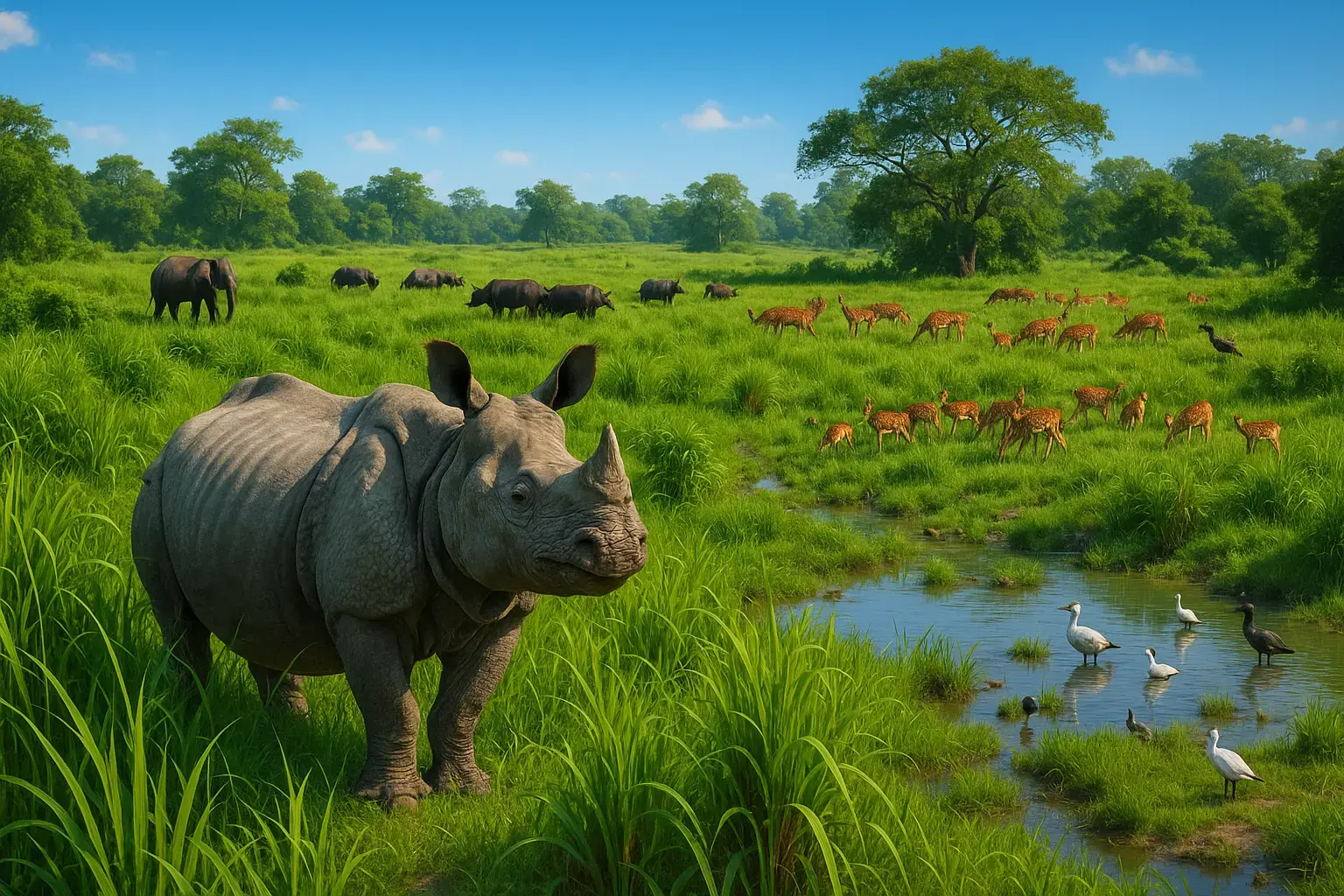
The park offers exceptional wildlife viewing opportunities through jeep and elephant safaris, providing close encounters with rhinoceros, tigers, elephants, wild buffalo, and numerous bird species. Kaziranga National Park remains open from November to April, ensuring optimal wildlife sightings during favorable weather conditions.
Majuli: The World's Largest River Island
Majuli Island represents a unique cultural and geographical wonder, spanning 352 square kilometers in the Brahmaputra River. This UNESCO-recognized site serves as a major center of Vaishnavite culture, housing numerous Satras (monasteries) that preserve ancient art, music, and dance traditions.
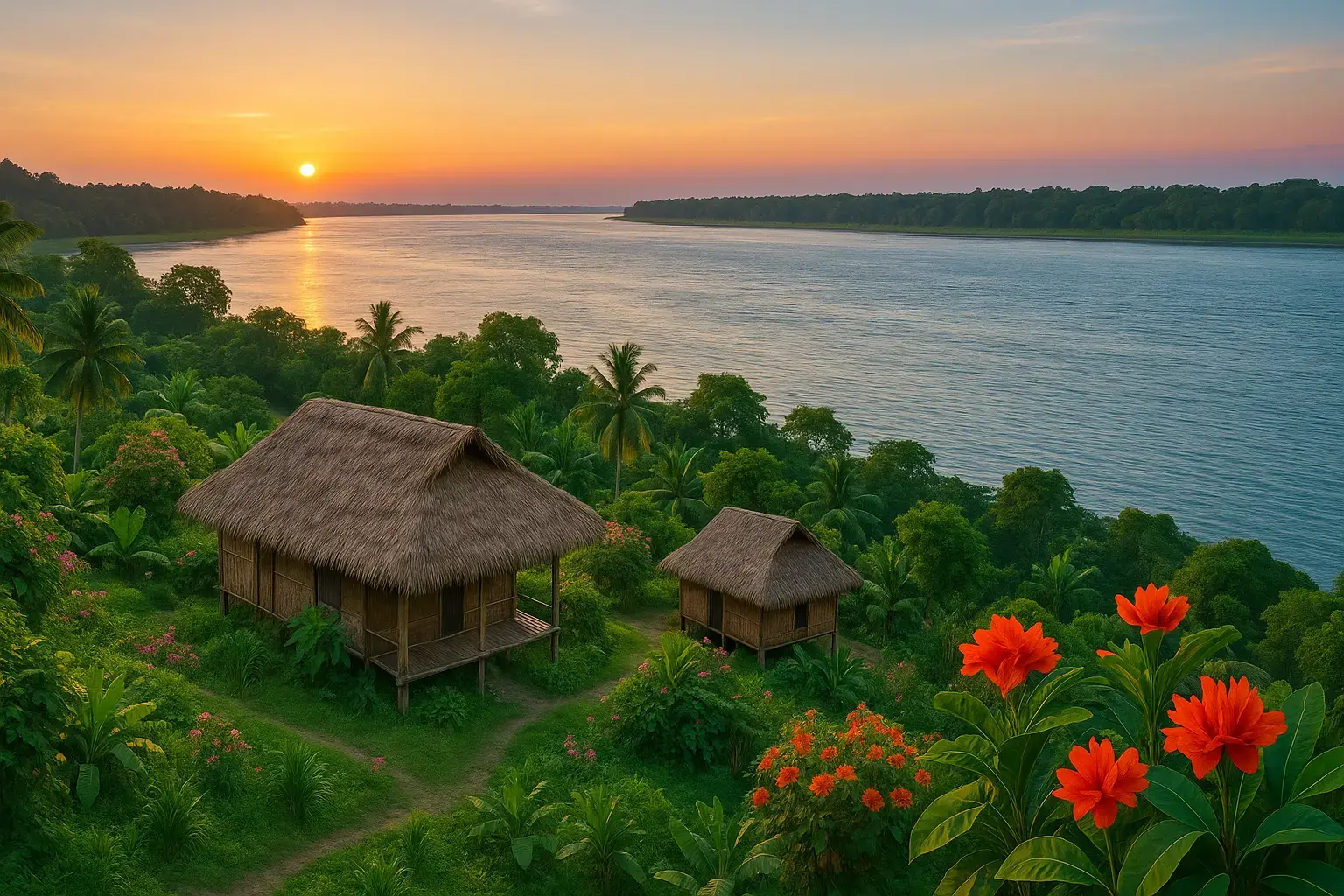
Visitors can explore significant Satras including Kamalabari, Auniati, and Dakhinpat, each showcasing distinct architectural styles and cultural artifacts. Majuli also offers excellent birdwatching opportunities, traditional mask-making demonstrations, and handloom weaving experiences that highlight local craftsmanship.
Kamakhya Temple: Sacred Pilgrimage Destination
Kamakhya Temple crowns Guwahati's Nilachal Hills as one of India's most revered Shakti Peethas, dedicated to the goddess Kamakhya. This ancient temple complex encompasses multiple shrines honoring the ten Mahavidyas, creating a comprehensive spiritual destination.
The temple's unique architecture and hilltop location offer panoramic views of the Brahmaputra River and surrounding landscapes. Kamakhya Temple attracts thousands of devotees during the annual Ambubachi Mela, making it a significant pilgrimage and cultural tourism destination.
Manas National Park: Himalayan Foothills Wilderness
Manas National Park provides pristine wilderness experiences in the Eastern Himalayan foothills, contiguous with Bhutan's Royal Manas National Park. This UNESCO World Heritage Site protects rare and endangered species including Assam roofed turtle, golden langur, pygmy hog, and wild water buffalo.
The park's diverse ecosystems support Project Tiger conservation efforts while offering excellent opportunities for wildlife photography and nature tourism. Manas National Park operates from November to April, providing optimal conditions for wildlife viewing and adventure activities.
Sivasagar: Historical Heritage Town
Sivasagar showcases Assam's rich Ahom dynasty heritage through impressive architectural monuments including the Sivasagar Sivadol complex. These 18th-century temple structures, built by Queen Ambika, demonstrate sophisticated construction techniques and artistic excellence.
The Sivasagar tank and surrounding temples create a serene historical landscape that attracts heritage enthusiasts and spiritual seekers. This destination offers insights into Assam's medieval period and the Ahom kingdom's cultural contributions.
Tea Gardens and Plantation Tourism
Assam tea gardens provide immersive experiences that showcase the region's most famous export industry. Visitors can explore plantation processes, interact with tea workers, and learn about cultivation techniques that produce world-renowned Assam tea.
Sualkuchi, known as the "Manchester of the East," offers silk weaving demonstrations and cultural interactions with indigenous artisans. These destinations combine agricultural tourism with cultural education, providing comprehensive insights into Assam's economic and social fabric.
Offbeat Destinations and Hidden Gems
Haflong, Assam's only hill station, offers scenic beauty through the "Land of Blue Hills" with serene lakes and lush landscapes. This destination provides relief from plains humidity while showcasing Dimasa and Zeme Naga tribal cultures.
Nameri National Park provides quiet wilderness experiences with walking trails, river rafting opportunities, and camping facilities that appeal to adventure enthusiasts. Unlike other parks, Nameri emphasizes foot exploration and water-based activities.
Travel Tips: Planning Your Perfect Assam Adventure
Best Time to Visit Assam
The optimal period for travel to Assam extends from October to April, when pleasant weather conditions enhance sightseeing, festival participation, and wildlife viewing experiences. Winter months offer comfortable temperatures ranging from 8°C to 25°C, perfect for outdoor activities and cultural exploration.
November to March provides ideal conditions for Kaziranga National Park visits, Majuli exploration, and festival participation. This period ensures clear skies, minimal rainfall, and optimal wildlife sightings across all major attractions.
Cultural Experiences and Local Hospitality
Assamese hospitality reflects genuine warmth and welcoming attitudes toward visitors, creating memorable cultural exchange opportunities. Local communities eagerly share traditional practices, culinary knowledge, and cultural stories that enrich travel experiences.
Festival seasons offer exceptional opportunities to witness authentic celebrations, participate in community activities, and taste traditional foods prepared specifically for special occasions. These experiences provide deep insights into Assam's culture and social traditions.
Transportation and Accessibility
Guwahati serves as the primary gateway for Assam tourism, offering excellent connectivity through Lokpriya Gopinath Bordoloi International Airport and railway networks. The city provides convenient access to major attractions including Kaziranga, Majuli, and Kamakhya Temple.
Ferry services connect Majuli Island from Nimati Ghat near Jorhat, adding scenic river journey experiences to the travel itinerary. These transportation options ensure comfortable access to diverse destinations while maintaining authentic travel experiences.
Essential Experiences and Must-Try Activities
Wildlife safaris at Kaziranga and Manas provide world-class nature experiences, while Majuli offers cultural immersion through Satra visits and traditional craft demonstrations. Tea garden tours combine agricultural education with scenic beauty, creating comprehensive regional understanding.
Festival participation during Bihu celebrations, Jonbeel Mela, or Ambubachi Mela provides authentic cultural experiences that showcase Assam's diverse traditions and community spirit. These events offer photography opportunities, cultural learning, and memorable social interactions.
Conclusion: Assam - Where Culture, Nature, and Tradition Converge
Assam tourism offers an extraordinary blend of cultural richness, natural beauty, and authentic experiences that create lasting memories for every visitor. From the rhythmic celebrations of festivals of Assam to the aromatic delights of Assamese food and the breathtaking wildlife encounters in Kaziranga, this northeastern gem provides comprehensive travel experiences that satisfy diverse interests.
The state's unique position as a cultural bridge between India and Southeast Asia creates distinctive traditions, flavors, and experiences unavailable elsewhere in the country. Travel to Assam means embracing a region where ancient traditions thrive alongside modern conservation efforts, where community festivals welcome strangers as family, and where every meal tells a story of agricultural heritage and culinary creativity.
Whether seeking spiritual enlightenment at Kamakhya Temple, wildlife adventures in Manas National Park, cultural immersion on Majuli Island, or simply the pleasure of sharing traditional Assamese cuisine with local families, Assam delivers authentic experiences that transform visitors into ambassadors of northeastern India's remarkable heritage.
The culture of Assam continues to evolve while maintaining its fundamental values of hospitality, community celebration, and environmental harmony. This dynamic balance ensures that Assam tourism remains both authentic and accessible, providing meaningful connections between visitors and local communities while preserving the cultural integrity that makes this region so special.
Plan your journey to Assam during the optimal November-March period, embrace the festival seasons, savor every traditional dish, and prepare for wildlife encounters that will redefine your understanding of India's incredible biodiversity and cultural diversity. Assam awaits with open arms, traditional melodies, aromatic kitchens, and natural wonders that promise to create your most memorable Indian adventure.